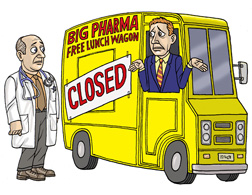September 5th, 2010 by DrWes in Better Health Network, Health Policy, Opinion, True Stories
No Comments »

I received the following e-mail from a patient (paraphrased):
Dear Dr. Fisher,
Thank you for trying to switch me from lisinopril to generic losartan (Cozaar) to help me with the irritating cough that has been nagging me since I was placed on lisinopril. I did not pick up my prescription, though. At nearly $200 for a three-month supply, I’ve decided to live with the cough, since the same amount of lisinopril costs me about $12.
-Ms. Patient
Interesting how the generic drug market for some drugs only marginally discounts prices. Since the companies that make generics did not have to absorb research and development costs, how do they justify the exorbitant prices? Simple: The middlemen still have to get theirs.
-WesMusings of a cardiologist and cardiac electrophysiologist.
*This blog post was originally published at Dr. Wes*
September 2nd, 2010 by RyanDuBosar in Better Health Network, Health Policy, News, Research
No Comments »

Patients are pill-splitting more to trim back healthcare costs, according to a poll by Consumer Reports. In the past year, 39 percent took some action to cut costs.
The poll of more than 1,100 people found that 45 percent of people take at least one prescription drug and average four. But 27 percent said they didn’t always comply with a prescription, and 38 percent of those younger than 65 without drug coverage didn’t fill prescriptions at all.
Just over half of patients felt that doctors didn’t consider their ability to pay when prescribing a drug, while nearly half blamed drugmaker’s influence for physicians’ prescribing habits. (HealthLeaders Media)
*This blog post was originally published at ACP Internist*
July 6th, 2010 by GarySchwitzer in Better Health Network, Health Policy, News, Opinion, Quackery Exposed
No Comments »

 “Appetite for Instruction: Why Big Pharma should buy your doctor lunch sometimes” is the headline of an article on Slate.com that has upset many readers. I’m not terribly upset about it because it just seems too naive and misinformed to get upset about. The final line of the piece tells you all you need to know about the tone of the column:
“Appetite for Instruction: Why Big Pharma should buy your doctor lunch sometimes” is the headline of an article on Slate.com that has upset many readers. I’m not terribly upset about it because it just seems too naive and misinformed to get upset about. The final line of the piece tells you all you need to know about the tone of the column:
“Ousting commercial support is creating a huge chasm in medical education, leaving doctors not only hungry but also starved for knowledge.”
A number of online comments were posted in reaction to the piece. Read more »
*This blog post was originally published at Gary Schwitzer's HealthNewsReview Blog*
June 18th, 2010 by Peggy Polaneczky, M.D. in Better Health Network, Opinion, Quackery Exposed, True Stories
No Comments »

 I don’t know about the rest of you medical bloggers, but I’ve been getting emails from folks who run a website called DrugWatch.com asking for reciprocal links and promoting themselves as the go-to place for patients to get up-to-date information on medication safety.
I don’t know about the rest of you medical bloggers, but I’ve been getting emails from folks who run a website called DrugWatch.com asking for reciprocal links and promoting themselves as the go-to place for patients to get up-to-date information on medication safety.
Tucked into the website is this promise: “We will never accept advertising from the pharmaceutical industry.” Right. Because the whole site is a front for a bunch of Orlando lawyers trying to sniff out potential clients for medication-related lawsuits against the pharmaceutical industry. Read more »
*This blog post was originally published at The Blog that Ate Manhattan*
May 17th, 2010 by RyanDuBosar in Better Health Network, Health Policy, News
No Comments »

Congressional democrats want more transparency in healthcare, believing it would further drive down the cost of care, reports Politico.
Hoping to drive competition, some lawmakers are grumbling to force doctors to reveal business negotiations between them and drug and device makers. Opponents worry that manipulating economics would backfire. If everyone knows their competitor’s business, why bother negotiating lower prices?
But transparency worked for Wisconsin’s hospitals, not in business dealings but in reporting outcomes, reports The Fiscal Times. By voluntarily revealing clinical outcomes on the Web, the Wisconsin Collaborative for Healthcare Quality was able to spur low-performing hospitals to improve, high-performing facilities to eliminate tests that didn’t improve outcomes, and create an informed healthcare consumer with choices where to receive care.
*This blog post was originally published at ACP Hospitalist*





 “
“









